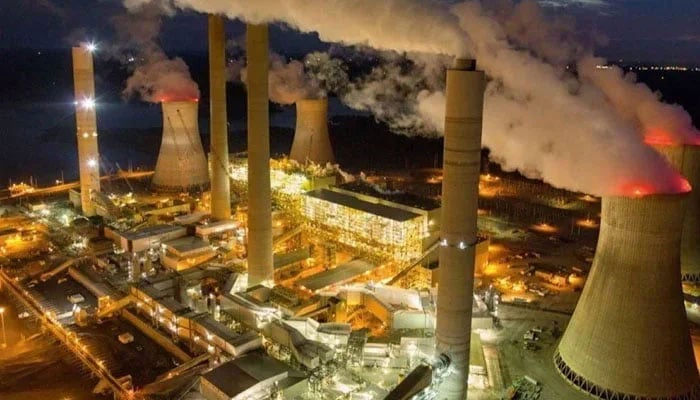Jamshoro’s new coal-fired power plant set to begin operations
KARACHI: The new Unit-I of the coal-fired power plant in Jamshoro is set to begin operations shortly following a successful trial conducted a few weeks ago.
The plant is awaiting its formal inauguration and will operate using 80 per cent imported coal and 20 per cent local coal. Funded by the Asian Development Bank and owned by the government of Pakistan, the plant utilizes advanced supercritical technology designed to improve energy efficiency. Officials involved in the project highlighted that this plant marks a significant technological advancement and is a strategic asset for the energy sector.
This unit, with a capacity of 660MW, is the first of its kind, with plans to develop a second unit of the same capacity in the future. The plant is expected to bolster the country’s energy security.
Despite the anticipated benefits, there are concerns about potential environmental impacts due to the plant’s reliance on coal. However, project officials have addressed these concerns, asserting that all environmental issues have been thoroughly considered and mitigated.
Mehwish Laghari, an environmental expert at the Policy Research Institute for Equitable Development (PRIED), shared her concerns about the environmental impact of the coal-based plant. She noted that the original Jamshoro power plant units used furnace oil and gas, but the new coal plant underwent an environmental impact assessment (EIA) where some issues may not have been fully addressed.
Laghari mentioned that the first 660 MW unit is complete, with plans to develop an additional unit. She also highlighted that land acquisition for an ash pond, which requires 100 acres, is still awaiting approval from the Sindh cabinet.
She explained that while the ADB has funded the project for imported coal, transitioning entirely to local coal would require ADB’s approval. Laghari also pointed out that using 20 per cent Thar coal could have environmental repercussions due to transportation issues.
Officials, however, have assured that the plant will not pose significant environmental or social risks. They stated that the Sindh government has been approached to allocate land for the ash pond, and the ash will be transported to cement and construction block factories, where it can be used beneficially.
They emphasized that ADB has prioritized environmental and social considerations in the project, which is why supercritical technology was chosen to minimize environmental risks associated with coal burning.
-
 Inside Cardi B's Real Feelings Related To Stefon Diggs Split Post One Year Of Romance
Inside Cardi B's Real Feelings Related To Stefon Diggs Split Post One Year Of Romance -
 Former Sri Lankan Intelligence Chief Arrested Over 2019 Easter Bombings
Former Sri Lankan Intelligence Chief Arrested Over 2019 Easter Bombings -
 Kristen Bell Shares One Rule For 'SAG' Awards Ceremony That She Will Ditch This Time: 'Happy And Fun'
Kristen Bell Shares One Rule For 'SAG' Awards Ceremony That She Will Ditch This Time: 'Happy And Fun' -
 Woman Suing Meta Platforms, YouTube Over Social Media Addiction Sticks To Claims After Trial
Woman Suing Meta Platforms, YouTube Over Social Media Addiction Sticks To Claims After Trial -
 Shakira Applauded For 'gracious' Behaviour By Fans As She Blends Work With Family Downtime
Shakira Applauded For 'gracious' Behaviour By Fans As She Blends Work With Family Downtime -
 Prince William Hits The Roof With The Andrew Saga Bleeding Into Earthshot
Prince William Hits The Roof With The Andrew Saga Bleeding Into Earthshot -
 Mexico’s President Considers Legal Action Over Elon Musk Cartel Remark
Mexico’s President Considers Legal Action Over Elon Musk Cartel Remark -
 HBO Gives Major Update About 'Industry' Season Five And Show's End
HBO Gives Major Update About 'Industry' Season Five And Show's End -
 Donnie Wahlberg Responds To 'Boston Blue' Backlash: 'Nobody Was More Disappointed Than Me'
Donnie Wahlberg Responds To 'Boston Blue' Backlash: 'Nobody Was More Disappointed Than Me' -
 Jennifer Garner Gets Emotional Over Humble Career Start: 'It Makes Me Want To Cry'
Jennifer Garner Gets Emotional Over Humble Career Start: 'It Makes Me Want To Cry' -
 Princess Beatrice Told An Acquaintance That She ‘likes’ Jeffrey Epstein: Grim Verdict Drops
Princess Beatrice Told An Acquaintance That She ‘likes’ Jeffrey Epstein: Grim Verdict Drops -
 Late Katherine Short's Neighbours Give Insights Into Her 'peace Loving' Personality Post Suicide
Late Katherine Short's Neighbours Give Insights Into Her 'peace Loving' Personality Post Suicide -
 Fresh Details Of King Charles, Queen Camilla's US Visit Emerge Amid Andrew Investigation
Fresh Details Of King Charles, Queen Camilla's US Visit Emerge Amid Andrew Investigation -
 Iran 'set To Buy' Chinese Carrier-killer Missiles As US Forces Gather In Region
Iran 'set To Buy' Chinese Carrier-killer Missiles As US Forces Gather In Region -
 Prince Harry And Meghan Unlikely To Meet Royals In Jordan
Prince Harry And Meghan Unlikely To Meet Royals In Jordan -
 Hero Fiennes Tiffin Shares Life-changing Advice He Received From Henry Cavill
Hero Fiennes Tiffin Shares Life-changing Advice He Received From Henry Cavill




